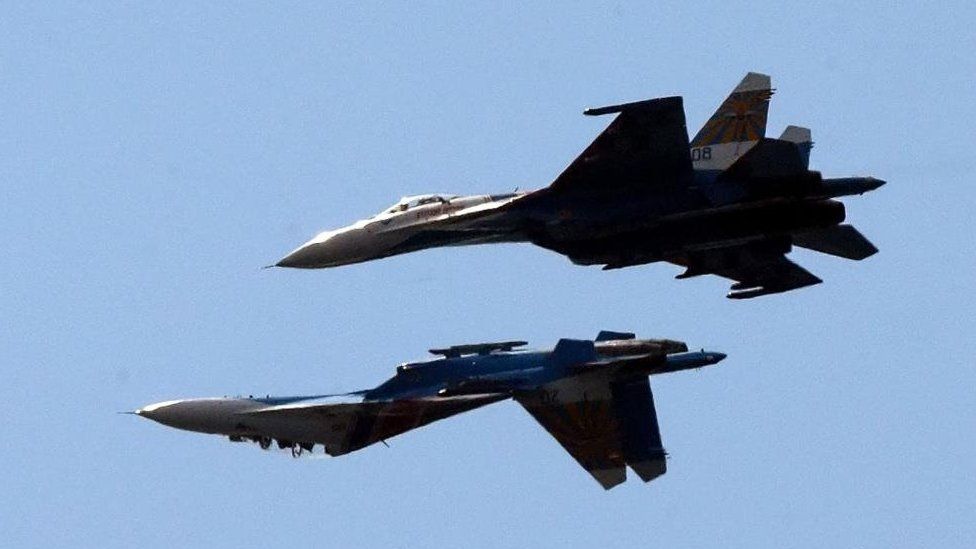ARTICLE AD BOX
 Image source, EPA
Image source, EPA
Russian SU-27s
A US drone that crashed into the Black Sea is at the heart of a new row between Washington and Moscow. The US has said it brought down the drone after a Russian fighter jet clipped it.
Moscow has denied this, saying the drone caused its own failure. This is everything we know (and don't know).
What has the US said?
The US said its unmanned MQ-9 Reaper drone suffered damage on 14 March after two Russian Su-27 jet fighters intercepted it over the Black Sea.
One jet "struck the propeller" of the drone, the US said, forcing US forces "to have to bring the MQ-9 down in international waters".
The confrontation lasted around 30-40 minutes, US officials said. They claimed the Russian jets dumped fuel on the drone several times before the collision.
The Russian pilot's actions "nearly caused both aircraft to crash," said Pentagon spokesperson Pat Ryder, adding that the Russian jet probably was damaged but was still able to land.
US officials have not said whether the drone was carrying missiles.
Pentagon officials have suggested that they may declassify and release video of the collision.
What does Russia say?
Russia denies the US' version of events. It blames the crash on a "sharp manoeuvre" performed by the drone, rather than any physical contact between the aircrafts.
Moscow also denies that any of its jets were damaged during the encounter.
Russian officials said the drone was flying with its communication transponders turned off, and that it had violated restricted airspace.
After being summoned to speak to officials in Washington, Russian ambassador to the US, Anatoly Antonov, said Moscow saw the drone incident as "a provocation".
From the Kremlin's point of view, Mr Antonov added: "The unacceptable activity of the US military in the close proximity to our borders is a cause for concern."
After speaking by phone to the US secretary of defence for the first time since December, Russian defence minister Sergei Shoigu blamed the incident on "increased reconnaissance activities against the interests of the Russian Federation".
Recovery efforts
Russia has confirmed that it is attempting to recover wreckage of the drone, which may have sunk to depths of up to 5,000 feet (1,500m) below the surface.
"I don't know whether we'll be able to retrieve it or not but it has to be done," Russian security council secretary Nikolai Patrushev said on state TV.
General Mark Milley, America's top military general, said that "mitigating measures" were taken to prevent any sensitive data from falling into Russia's hands.
On Wednesday, he said that the US does not have any ships in the Black Sea, complicating search and recovery efforts, but it does "have a lot of allies and friends in the area".
"We'll work through recovery operations, that's US property," he told reporters, adding that there was "probably not a lot to recover" anyway.
It remains unclear where the incident took place. An unnamed US official told CNN that it happened about 45 miles southwest of the Crimean peninsula, and that the drone came down 70 miles southwest of the Russian-annexed Ukrainian territory.
Was it intentional?
Neither side denies that the incident took place after Russia attempted to intercept the drone.
In the US, officials have speculated about whether the Reaper was brought down deliberately or by accident.
General Milley said on Wednesday that it is still too early to say.
But State Department spokesman Ned Price told reporters that "the best assessment right now is that it probably was unintentional".
"It probably was the result of profound incompetence on the part of one of these Russian pilots."
Regardless, danger is high when escalations like this occur, says US General David Berger, commandant of the US Marine Corps.
On Tuesday he told reporters that his 'biggest worry" is "either intentionally or unintentionally things bumping into each other causing a collision," creating an international crisis.
What is the context?
Tensions have risen over the Black Sea ever since Russia's widely-condemned annexation of nearby Crimea in 2014.
And since Russia's full-scale invasion of Ukraine in 2022, the US and the UK have stepped up surveillance flights in international airspace.
Kremlin spokesman Dmitry Peskov said on Wednesday that relations between the US and Russia are in a "deplorable state", and at their "lowest point".
Washington has led efforts to place financial sanctions on Russia and has provided money, weapons, ammunition, and military training to Ukraine.
US drone crash inevitable, Ukraine minister tells BBC

 2 years ago
68
2 years ago
68








 English (US) ·
English (US) ·